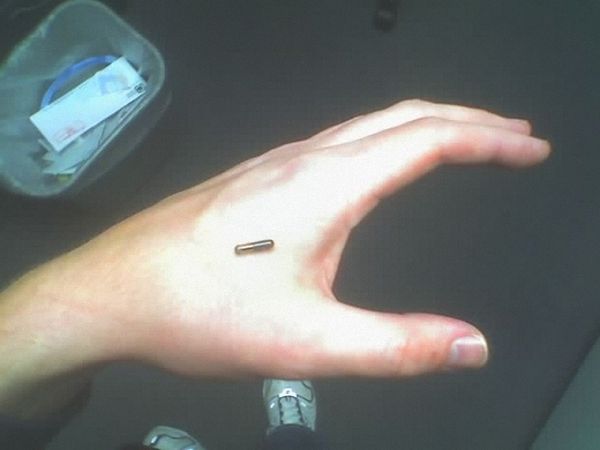Company to implant 50 staffers with biochips in first-of-its-kind program in U.S.

The dystopian future imagined by troves of sci-fi writers – where humanity foregoes privacy in exchange for a “tag” that makes life more convenient – might be just around the corner.
River Falls, Wisconsin-based micro market technology company Three Square Market (32M) provides self-service stores for office buildings. The company recently revealed it is on its way to becoming the first U.S. business to provide implanted microchip technology to its employees.
As part of an optional program to kick off August 1, 50+ “volunteer” employees will be implanted with a Radio-Frequency Identification (RFID) chip between their thumb and index finger – presumably the one place on one”s hand with enough flesh to hold the device. The procedure is said to be almost painless and takes mere seconds.
With a swipe of the hand, users will be able to open doors, log in to computers, use the copy machine or make purchases in their break-room micro market.
“We foresee the use of RFID technology to drive everything from making purchases in our office break room market, opening doors, use of copy machines, logging into our office computers, unlocking phones, sharing business cards, storing medical/health information, and used as payment at other RFID terminals,” says 32M CEO Todd Westby. “Eventually, this technology will become standardized allowing you to use this as your passport, public transit, all purchasing opportunities, etc.”
COO Patrick McMullan adds that mobile and chip technology usage is “far more advanced” in Europe than in the U.S., making the Old Continent ripe for the picking as far as biochip makers are concerned.
When Swedish startup hub Epicenter announced a similar initiative earlier this year, many people voiced privacy and security concerns.
Health data, location tracking, working hours and even the number of toilet breaks are all details that a biohacker, or indeed your employer, might obtain from your implant and possibly use against you, microbiologist Ben Libberton suggested in a report published by the AP just months ago.
Results from a Pew Research survey published in March revealed huge education gaps among American corporate workers in terms of cybersecurity, making them critical risk factors for corporate environments.
Biochip implants may well reduce the risks of corporate data leaks. In a sense, corporate infrastructures could become safer thanks to RFID chips implanted in employees” bodies. However, knowing that your every move might be tracked thanks to an implant in your hand can be, to put it mildly, a bit unnerving.
tags
Author
Filip has 15 years of experience in technology journalism. In recent years, he has turned his focus to cybersecurity in his role as Information Security Analyst at Bitdefender.
View all postsRight now Top posts
Outpacing Cyberthreats: Bitdefender Together with Scuderia Ferrari HP in 2025
March 12, 2025
Streamjacking Scams On YouTube Leverage CS2 Pro Player Championships to Defraud Gamers
February 20, 2025
How to Identify and Protect Yourself from Gaming Laptop Scams
February 11, 2025
Your Device ‘Fingerprint’ Will Go to Advertisers Starting February 2025
December 24, 2024
FOLLOW US ON SOCIAL MEDIA
You might also like
Bookmarks








